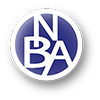My responses are in the attached document (attached in two formats: DOCX and PDF) and are summarized below.
- I would follow print and transcribe “Area” unspaced from the parenthesis that follows it.
(i.e., ⠠⠁⠗⠑⠁⠷⠫⠞⠀⠠⠁⠠⠃⠠⠉⠾⠀⠨⠅⠀⠠⠁⠗⠑⠁⠷⠫⠞⠀⠠⠁⠠⠃⠠⠙⠾)
- I think you are asking if an opening Nemeth Code indicator should always be placed before a blank line. The answer to that question is “no.” Or, perhaps you are asking if an opening Nemeth Code indicator that precedes a tactile graphic should always be followed by a blank line. My answer to that question is “yes.” (Since we do not have Tactile Graphic Guidelines that apply to UEB or Nemeth-within-UEB, my answer is all that I can give.)
- First, let’s talk about bullets: Following Rules of UEB and Braille Formats (especially §8.6.2 of BF2016) would result in the transcription you have provided (where ⠸⠫⠼⠙ is used for the bullets that are solid squares). Nicely done! If I were transcribing bullets that are solid squares in Nemeth Code, I would use the solid shape indicator with the square shape for them (i.e., ⠫⠸⠲).
- Now let’s talk about Nemeth Code switches with bulleted lists: Since our goal is consistency, we should use the same braille symbol for the same print bullet all the time. In other words,
- if all of print’s ∎ bullets can appear within Nemeth Code, then use Nemeth Code to transcribe all of your solid square bullets.
- if only some of print’s ∎ bullets can appear within Nemeth Code, then use UEB to transcribe all of your solid square bullets.
- In math, the tilde can be used as either a sign of operation or as a sign of comparison. Any single instance of a print tilde must be one or the other (operation or comparison). Only context can tell.
- When a tilde is used as a sign of operation, it means “not.”
- When a tilde is used as a sign of comparison, it means “is related to” or “is similar to.”
- The space around a tactile graphic’s point symbol may be helpful in any kind of graphic. The space (aka “negative space” or “white space”) can allow the reader to distinguish between the point and the surrounding material. However, the significant change in height that can be achieved with collage graphics may accomplish this same goal (distinguishing between one element and another), so negative space in your examples if they are collage graphics may not be necessary in order for the graphic to be clear to the reader.
Thank you!
–Kyle
-
This reply was modified 7 years, 5 months ago by
 kdejute. Reason: update commentary on negative space in collage graphics – perhaps not necessary
kdejute. Reason: update commentary on negative space in collage graphics – perhaps not necessary
Attachments:
You must be
logged in to view attached files.
